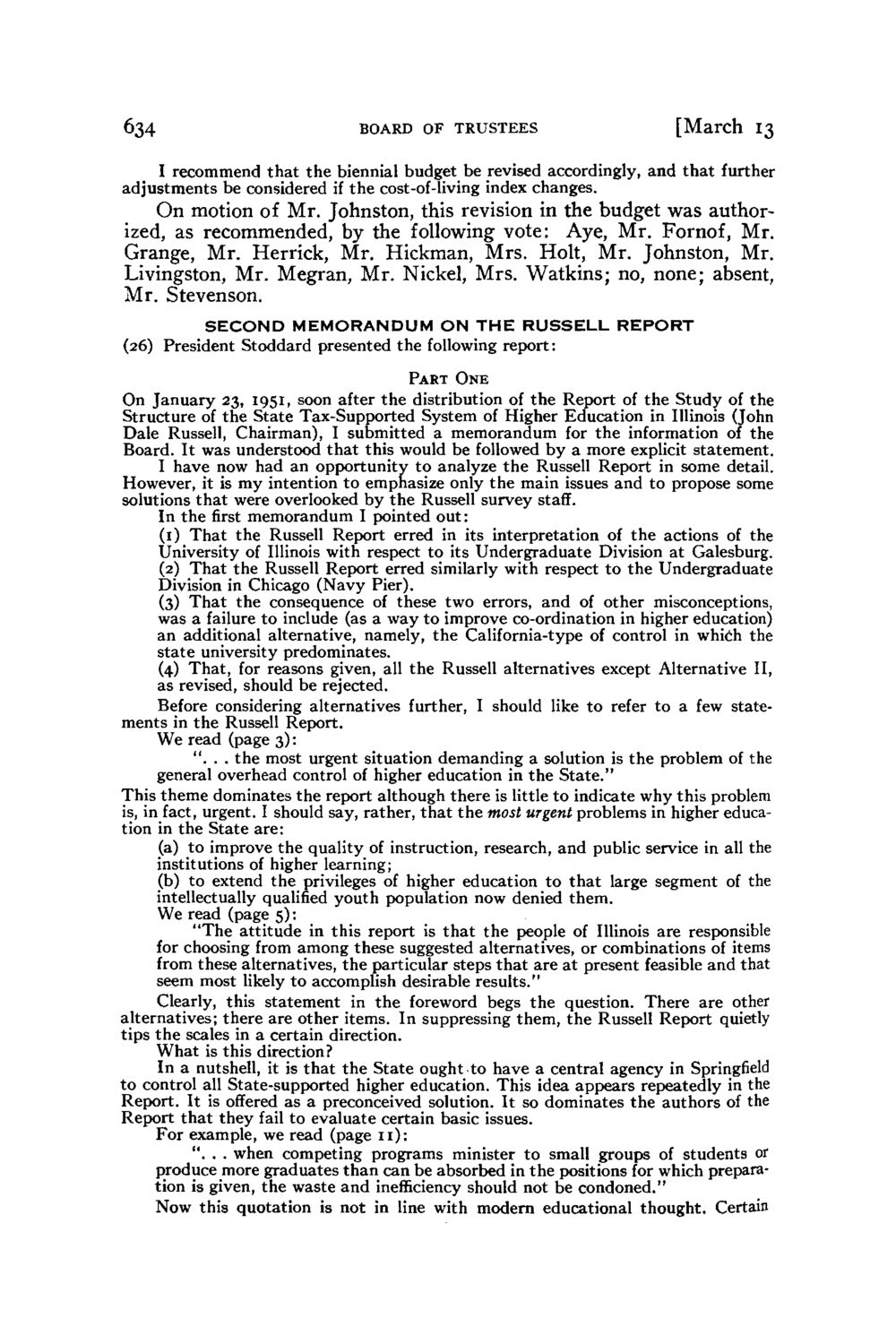| |
| |
Caption: Board of Trustees Minutes - 1952
This is a reduced-resolution page image for fast online browsing.

EXTRACTED TEXT FROM PAGE:
634 BOARD OF TRUSTEES [March 13 I recommend t h a t t h e biennial budget be revised accordingly, and that further adjustments be considered if t h e cost-of-living index changes. On motion of Mr. Johnston, this revision in the budget was authorized, as recommended, by the following vote: Aye, Mr. Fornof, Mr. Grange, Mr. Herrick, Mr. Hickman, Mrs. Holt, Mr. Johnston, Mr. Livingston, Mr. Megran, Mr. Nickel, Mrs. Watkins; no, none; absent, Mr. Stevenson. S E C O N D M E M O R A N D U M O N THE RUSSELL REPORT (26) President Stoddard presented the following report: PART O N E On January 23, 1951, soon after t h e distribution of t h e Report of the Study of the Structure of the State Tax-Supported System of Higher Education in Illinois (John Dale Russell, Chairman), I submitted a memorandum for t h e information of the Board. It was understood that this would be followed by a more explicit statement. I have now had an opportunity to analyze t h e Russell Report in some detail. However, it is my intention to emphasize only the main issues and to propose some solutions that were overlooked by t h e Russell survey staff. In the first memorandum I pointed out: (1) T h a t the Russell Report erred in its interpretation of the actions of the University of Illinois with respect to its Undergraduate Division at Galesburg. (2) That the Russell Report erred similarly with respect to the Undergraduate Division in Chicago (Navy Pier). (3) T h a t the consequence of these two errors, and of other misconceptions, was a failure to include (as a way to improve co-ordination in higher education) an additional alternative, namely, the California-type of control in which the state university predominates. (4) That, for reasons given, all the Russell alternatives except Alternative II, as revised, should be rejected. Before considering alternatives further, I should like to refer to a few statements in t h e Russell Report. We read (page 3): ". . . the most urgent situation demanding a solution is the problem of the general overhead control of higher education in the State." This theme dominates the report although there is little to indicate why this problem is, in fact, urgent. I should say, rather, t h a t t h e most urgent problems in higher education in the State are: (a) to improve the quality of instruction, research, and public service in all the institutions of higher learning; (b) to extend the privileges of higher education to t h a t large segment of the intellectually qualified youth population now denied them. We read (page 5): " T h e attitude in this report is t h a t the people of Illinois are responsible for choosing from among these suggested alternatives, or combinations of items from these alternatives, the particular steps t h a t are at present feasible and that seem most likely to accomplish desirable results." Clearly, this statement in t h e foreword begs t h e question. There are other alternatives; there are other items. In suppressing them, the Russell Report quietly tips t h e scales in a certain direction. What is this direction? In a nutshell, it is t h a t the State ought to have a central agency in Springfield to control all State-supported higher education. This idea appears repeatedly in the Report. It is offered as a preconceived solution. It so dominates the authors of the Report that they fail to evaluate certain basic issues. For example, we read (page 11): ". . . when competing programs minister to small groups of students or produce more graduates t h a n can be absorbed in the positions for which preparation is given, the waste and inefficiency should not be condoned." Now this quotation is not in line with modern educational thought. Certain
| |